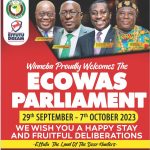
By Elsie Appiah-Osei
Winneba, Oct. 5, GNA – The Economic Community of West African States (ECOWAS) will focus predominantly on youth and women-related issues in 2024 through its youth Parliament, Dr Sidie Mohammed Tunis, Speaker of ECOWAS Parliament, has announced.
According to him, it was time the Community Parliament instituted a model Parliament for the youth to engage them on issues that were affecting them in the imprint of the recent turmoil in the sub-region.
“…To this end, ECOWAS Parliament, in the next budget cycle is expected to allocate a significant portion of its 2024 budget to women and youth issues to provide a listening and learning platform to matters that confront vulnerable groups in society and work towards addressing them.”
Dr Tunis announced this at the ongoing ECOWAS 5th Legislature Parliamentary seminar on the theme: “The Challenges of Unconstitutional Regime Change and Presidential Term Limits in West Africa: Role of the ECOWAS Parliament” underway in Winneba in the Central Region.
He said the ECOWAS Parliament was ready to work with national Parliaments and Assemblies on a framework aimed at affirming the Youth Parliament.
Dr Tunis explained that a forum that concentrated on addressing the concerns of the youth was extremely timely considering the current global political situation across the sub-region.
“As a result of the successes and the testimony received from the regions, I am pleased to announce that, in the 2024 budget we will host a second global summit for women and youth across the region before the end of this legislature.
“I am hopeful that an organised forum will help to discourage the youth from venturing into social vices that are detrimental to their well-being and assure of preparedness towards establishing an ECOWAS Youth Parliament which will provide a foundation for youth representation for formalised critical institutions such as parliament, and political parties, among others,” he said.
This is the second time Ghana has hosted the ECOWAS Parliament an institution of ECOWAS also known as the Community Parliament, which convenes twice a year.
It is the Assembly of Peoples of the Community serving as a forum for dialogue, consultation and consensus for Representatives of the people of West Africa to promote integration.
Established under Articles 6 and 13 of the ECOWAS Revised Treaty of 1993, the initial Protocol establishing the Parliament was signed in Abuja on August 6, 1994. It provided for the Structure, Composition, Competence and other matters relating to Parliament.
The Parliament is composed of 115 seats, with each Member State having a guaranteed minimum of five seats while the remaining 40 seats shall be shared based on population.
With the need for a community mechanism to forge greater ties with the citizens of the West African Community serving as momentum towards the creation of the Community Parliament, it strengthens representative democracy in the Community.
to contribute to the promotion of peace, security and stability in the West African Region by informing and sensitising the population on issues of integration, promotion and defending principles of human rights, democracy, the rule of law, transparency, accountability and good governance through the practices of accountability.
The 2023 First Ordinary Session of ECOWAS Parliament, which opened on Monday, May 8, 2023, in Abuja and ended on Friday, May 26, 2023, was convened under Article 21.1 of the Supplementary Act, relating to the enhancement of the powers of the ECOWAS Parliament, which provided that Parliament should meet twice a year in Ordinary Sessions to provide a platform to deliberate and strengthen Member States’ position on issues of regional and continental importance.
As provided for in Article 32 of the supplementary Act, the Session also provides the President of the ECOWAS Commission the opportunity to present a general report on the implementation of the Community Work Programme to the Plenary where the House would be updated with developments in the Community, and usually followed by debates, expressed opinions as well as recommendations.
Further, National Delegates would also have the opportunity to present their country’s reports as a means of informing the Body on unfolding developments in their respective Member States and the status of implementation of their community’s texts.
GNA